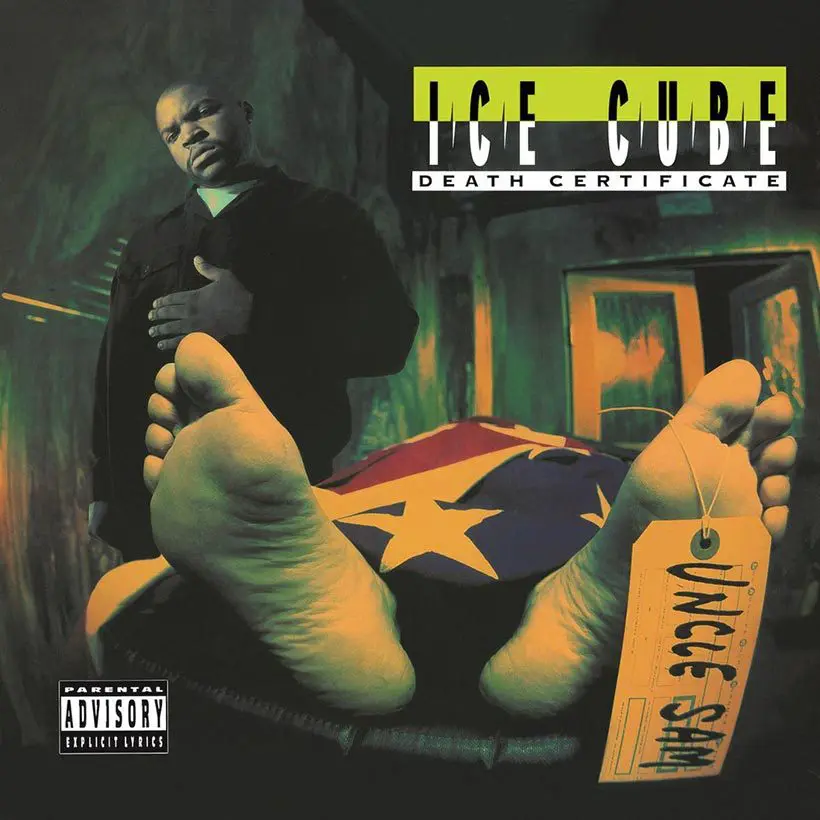‘Death Certificate’: Why Ice Cube’s Second Album Is A Certified Classic
Uneasy listening on a mission, ‘Death Certificate’ shocked many at the time, with Ice Cube kicking ass musically, verbally, and politically.

Ice Cube’s second album, Death Certificate, came at you like a runaway train. A heavily armed runaway train, in a very bad mood.
To recap: O’Shea Jackson, aka Ice Cube, left NWA in 1989. His debut solo album, AmeriKKKa’s Most Wanted, was a sensation, hitting like prime-time Tyson and stirring fury at both ends of the political spectrum with lyrics that poked many tender spots – political, emotional, or physical – you might care to name. His second record, the Kill At Will EP, revealed a more sensitive side through songs such as “The Product” and “Dead Homiez.” Hollywood was buzzing around him as an actor. Some pundits even suggested that Ice Cube was going soft.
Do you love 90s music? Buy the best 90s music on vinyl here or stream it on this playlist.
Released on October 29, 1991, Ice Cube’s Death Certificate blew that idea away. Furious, roughneck, aggressive, witty, vengeful, harsh, clever, and, yes, thoughtful, it’s one of the most satisfying and powerful albums of its era. Oh, and it’s highly funky too, using nothing but the highest-grade beats and samples of street jams. This time around, Cube took a cold-eyed look at some US institutions, such as the army and its relationship to mainstream America on “I Wanna Kill Sam”; gang life and its inevitable outcomes on “My Summer Vacation”; the medical system on “Alive On Arrival”; and gun ownership on “Man’s Best Friend.” In case you didn’t get the message, the sleeve finds Cube in the morgue, using his Class-A scowl over a Caucasian corpse tagged “Uncle Sam.”
Above all, as ever, the institution Cube addresses most is the restricted, often sadly inevitable course of life as a young black male in South Central Los Angeles. Naturally, this is not always a respectful business. Over a slapping beat built on a loop of Booker T & The MGs’ “Hip Hug-Her”, “Givin’ Up The Nappy Dug Out” has Cube telling a father what he’s been doing with his daughter, a minor, and it ain’t pretty; the tale is filthy, and in an outbreak of responsibility at the end, a talking condom offers advice. Inevitably, the next tune, “Look Who’s Burning,” is set in a clinic for sexually transmitted diseases; yeuchh.
The rumbling groove of “A Bird In the Hand” explores the legitimate options available for his brothers, and finds them sadly wanting; the reference to Republicans perhaps refers to Eazy-E, the NWA legend that Cube had written for, whose political preference was for the GOP, not a party many young African-Americans would have opted for. “Birth” and “Death” both feature Dr. Khalid Muhammad, the black nationalist minister, suggesting that Ice Cube was serious about trying to educate his audience while thrilling it.
Dr. Muhammad was regarded as controversial by mainstream politicians, but it wasn’t his presence on Death Certificate that stirred fury: two tracks in particular were reviled. “Black Korea” took a swipe at the owners of corner shops and was slated as racist, which Cube strongly denied, saying it was aimed at particular retailers. “No Vaseline,” a diss track aimed at the domes of NWA and their manager Jerry Heller, left no stone, however racially and homophobically dubious, unturned – and thrown. Cube had been attacked on NWA’s “100 Miles And Runnin’” and felt he had to respond, and respond rough. Such matters were in the blood of hip-hop, even if few rhymes took it this far.
Like Ice Cube’s previous album, Death Certificate is a sprawling affair. Trying to corral so many ideas and feelings into one place was evidently tricky, so Cube split the record into The Life Side and The Death Side. The latter came first, probably because, in Cube’s worldview, so many African-Americans died before they had a chance to live; Cube stated that he saw it as a statement of “where we are today.”
The Death side starts with ‛The Funeral” and ends in “Death,” but don’t go thinking the Life side is any more of a party. It’s meant to represent a better future, and “Us” makes a powerful statement, stating that black America has to fix its mindset before it can rise, while “True To The Game” verbally slaughters sellout stars. But it was “The Wrong Ni__a To F__k Wit” and “Steady Mobbin’,” tracks that could just be taken as straight gangsta lyrics, that drew the crowds, who would likely pick up on the album’s deeper messages later.
Brilliantly produced, endlessly funky, and laying complex breaks on top of each other, Death Certificate shocked many at the time (Island Records even cut two tracks from the original UK release) but has long since been acknowledged as a certified hip-hop classic. Uneasy listening on a mission, it kicks ass musically, verbally and politically, and it’ll blow you away. Perhaps literally.












